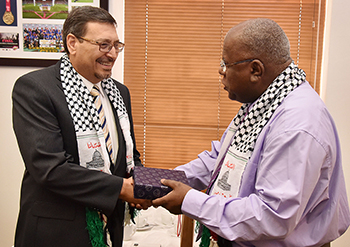Latest News Archive
Please select Category, Year, and then Month to display items
12 October 2020
|
Story Arina Engelbrecht
|
Photo Supplied
 Arina Engelbrecht from Organisational Development and Employee Well-being believes physical activity has a number of benefits for one’s health, including stress relief.
Arina Engelbrecht from Organisational Development and Employee Well-being believes physical activity has a number of benefits for one’s health, including stress relief.
Being physically active plays a big role in preventing the development of mental-health problems and in improving the quality of life of people experiencing mental-health problems.
Treatment for depression
Physical activity can be an alternative treatment for depression. It can be used as a stand-alone treatment or in combination with medication and/or psychological therapy. It promotes all kinds of changes in the brain, including neural growth, reduced inflammation, and new activity patterns are formed that promote feelings of calm and well-being. It releases endorphins – powerful chemicals in the brain that energise your spirit and make you feel good.
Physical activity can be very effective in relieving stress. Research in adults has found that physically active individuals tend to have lower stress levels compared to individuals who are less active. It also leads to improved sleep. When a person sleeps better and feels more rested, overall quality of life improves. They cope better with daily life stressors.
Reduce Alzheimer's risk
Regular physical activity can reduce your risk of developing Alzheimer's disease by up to 50%. It can also slow down further deterioration in those who have already started to develop cognitive problems. It stimulates the brain’s ability to maintain old connections as well as to make new ones.
A study asked people to rate their mood immediately after periods of physical activity (e.g. going for a walk/run, cycling, doing housework) and periods of inactivity (e.g. reading a book or watching television). Researchers found that participants felt more content, more awake, and calmer after being physically active compared to after periods of inactivity.
In conclusion, people who are physically active feel a sense of well-being, feel more energetic throughout the day, sleep better at night, have sharper memories, and feel more relaxed and positive about themselves and their lives.
“Being physically active not only changes your body, it changes your mind,
attitude, and your mood.” – Arina Engelbrecht
Palestinian delegation visit marks new bilateral relations
2015-11-27

Prof Jonathan Jansen and His Excellency Mr Hashem Dajani
Photo: Charl Devenish
|
The Office of International Affairs hosted the official visit of the Ambassador of Palestine, His Excellency Mr Hashem Dajani, to the University of the Free State (UFS) on 16-17 November 2015. Prof Jonathan Jansen, Vice-Chancellor and Rector of the UFS, welcomed the Ambassador and the Palestinian delegation to the Bloemfontein Campus. During the visit, they met with senior management of the university, including Dr Karen Lazenby (Registrar: Systems and Administration), Beata Mtyingizana (Director of International Affairs) and JC Van der Merwe (Deputy Director at the Institute of Reconciliation and Social Justice).
The visit marked the finalisation of a scholarship initiative which offers placement of Palestinian students to study at the UFS. The new Vice-Chancellor’s International Scholarship programme will recognise academic excellence and merit in undergraduate, postgraduate, as well as doctoral academic disciplines.
One of the strategic objectives of the UFS is that of internationalisation, which is strengthened by the scholarship programme. With the focus on Palestine, the university’s international footprint in non-traditional regions of the world, such as the Middle East, will therefore be highlighted.
To conclude the visit, the Institute for Reconciliation and Social Justice hosted a film screening featuring ‘Jerusalem, the east side story’. The documentary mainly looks at the past forty years of Israeli military occupation policies in Jerusalem and the subsequent impact on the city and its people.
“Peace in Palestine is key to world peace,” Ambassador Dajani said. “The issue of self-determination is central to the Palestinian effort, and, through the assistance of the international community, it can it be realised.”